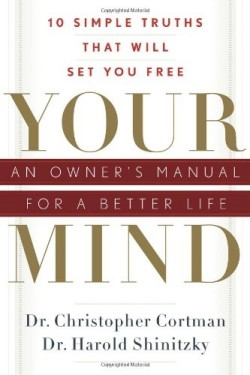Your Mind
An Owner's Manual for a Better Life
Who hasn’t spent too much time wishing about the past or worrying about the future? Who hasn’t considered friends or mates in light of their potential rather than the works-in progress that they really are? How can one overcome the feelings of helplessness and inertia that result from attempts to control the uncontrollable? In Your Mind: An Owner’s Manual for a Better Life, clinical psychologists Christopher Cortman and Harold Shinitzky use their combined 60,000 hours of clinical and counseling experience to distill the answers to these and more questions into ten simple statements, or “Truths.”
The authors illustrate each Truth with examples, and the numerous issues with which people grapple on a daily basis spring to life in tight, vividly-told stories: overworking; overeating; physical, sexual, and substance abuse; extramarital affairs. The authors offer not only practical advice, but insightful explanations of why people favor some options over others in responding to problems. For example, it’s not uncommon for people to hold onto anger or resentment, as if forgiveness would somehow devalue the importance of whatever upset them in the first place. Compulsive behaviors-such as smoking-are difficult to stop in part because society emphasizes a life “with no pain or discomfort”; the expectation of temporary discomfort can discourage people from quitting tobacco.
The Truths address the intangible properties of thought as well. Messages like “emotions begin with perceptions” are presented with fresh and common-sense explanations. Readers are asked to view uncomfortable emotions as messages-an indication that one’s thought or belief system is providing a too-limited lens through which to understand an event.
An interesting dichotomy has emerged in the field of self-help: one that sometimes pits practical problem-solving against spiritual growth, and practice against theory. Drs. Cortman and Shinitzky set out to uphold both the holistic, positive-thinking mode that has a foothold on our self-help bookshelves of late, and a more traditional approach. The result is a surprisingly graceful combination which encourages personal and spiritual growth and offers a clinical framework with concrete ways to tackle standing emotional issues.
Disclosure: This article is not an endorsement, but a review. The publisher of this book provided free copies of the book to have their book reviewed by a professional reviewer. No fee was paid by the publisher for this review. Foreword Reviews only recommends books that we love. Foreword Magazine, Inc. is disclosing this in accordance with the Federal Trade Commission’s 16 CFR, Part 255.

